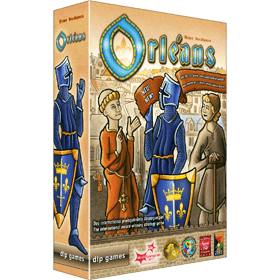Orléans
 Au cours des événements médiévaux autour d'Orléans, vous devez rassembler des fermiers, des marchands, des chevaliers, des moines, etc. pour atteindre une suprématie grâce au commerce, à la construction et à la science dans la France médiévale.
Au cours des événements médiévaux autour d'Orléans, vous devez rassembler des fermiers, des marchands, des chevaliers, des moines, etc. pour atteindre une suprématie grâce au commerce, à la construction et à la science dans la France médiévale.
Dans Orléans, vous recruterez des partisans et les mettrez au travail pour utiliser leurs capacités. Les fermiers et les bateliers vous fournissent de l'argent et des marchandises ; les chevaliers élargissent votre rayon d'action et sécurisent vos expéditions marchandes ; les artisans construisent des comptoirs d'échange et des outils pour faciliter le travail ; les érudits font progresser la science ; les commerçants ouvrent de nouveaux lieux pour que vous puissiez utiliser vos partisans ; et enfin, il ne faut pas négliger les monastères, car avec des moines à vos côtés, vous risquez beaucoup moins d'être la proie du destin.
Vous voudrez toujours effectuer plus d'actions que possible, et il existe de nombreux chemins vers la victoire. Le défi est de combiner tous les éléments du mieux possible en fonction de votre stratégie.
Nombre de joueurs: 2 - 5
Durée de la partie : 77 mn
Complexité : 3 / 5
Jouez à Orléans ou à 1227 autres jeux en ligne.
Sans téléchargement, directement depuis votre navigateur.
Avec vos amis et des milliers de joueurs du monde entier.
Gratuitement.

Jouez à Orléans ou à 1227 autres jeux en ligne.
Sans téléchargement, directement depuis votre navigateur.
Avec vos amis et des milliers de joueurs du monde entier.
Gratuitement.

Résumé des règles
Vue d'ensemble
Orléans est un jeu de placement d'ouvrier et de bag-building qui prend place dans la France médiévale. Vous allez rassembler des chevaliers, des moines, des fermiers et d'autres personnages pour réaliser des actions spécifiques. Cependant, chaque manche est accompagnée d'un nouvel évènement qui peut aider ou contrecarrer vos plans. À la fin, vous marquerez des points pour vos pièces, vos ressources, vos comptoirs, vos citoyens et votre progression sur la piste de développement.
Phases d'une manche
Une manche dans Orléans est composé de 7 phases, effectué dans cet ordre :
1. Révélez une nouvelle carte Évènement : Sur BGA, la carte est située dans le coin supérieur gauche de l'écran, près de votre nom. L'évènement est résolu à la fin de la manche. Il y a 6 types d'évènements dans le jeu, chacun existant en trois exemplaires :
~ Pèlerinage : Vous ne pouvez pas recruter de moines pendant cette manche. (c'est le seul évènement qui se déclenche au début de la manche)
~ Revenus : Vous recevez un nombre de pièces égal à votre niveau de développement.
~ Moisson : Vous devez payer 1 jeton Nourriture (céréales, fromage ou vin). Si vous ne pouvez pas, payez 5 pièces à la place. Si vous ne pouvez toujours pas, vous subissez la torture !
~ Taxes : Payez 1 pièce pour 3 marchandises que vous avez. Si vous ne pouvez pas, vous subissez la torture !
~ Commerce : Vous recevez 1 pièce par comptoir que vous avez construit.
~ Peste : Vous perdez temporairement 1 jeton Personnage. Piochez un jeton Personnage dans votre sac. Si c'est un personnage de votre couleur, remettez-le dans le sac. Sinon, il est mis de côté pour la manche en cours.
2. Récompenses et pénalités des fermiers : Le joueur dont le marqueur est le plus avancé sur la piste des fermiers (blanche) reçoit 1 pièce de la réserve. S’il y a égalité, aucun joueur ne reçoit de pièce. Le joueur dont le marqueur est le plus reculé doit payer 1 pièce à la réserve. S’il y a égalité, aucun joueur ne paie de pièce.
~ Dans une partie à 2 joueurs, le joueur qui est en retard sur la piste ne doit pas payer de pièce. Par contre, le joueur qui est devant reçoit bien une pièce.
3. Piocher des jetons personnages depuis son sac : Les joueurs piochent simultanément un nombre de jetons personnage depuis leur sac en fonction de leur avancée sur la piste des chevaliers (rouge). Ils sont ensuite placés sur le marché de leur plateau personnel.
~ Vous ne pouvez pas avoir plus de 8 jetons sur votre marché.
~ Lors de cette phase, vous pouvez refuser de piocher des partisans. Pour chaque partisan que vous refusez de piocher vous pouvez déplacer un jeton Personnage qui est sur une case d'action vers votre marché.
~ Les 4 jetons avec lesquels vous commencez portent votre couleur de joueur. Les restrictions liées à ces jetons de départ sont décrites plus bas.
4. Placer des jetons sur les cases d'action : Les joueurs placent simultanément leurs jetons sur des cases d'action de leur plateau joueur. Vous n'êtes pas obligé de placer tous les jetons de votre marché. Les jetons non utilisé ne sont pas renvoyés dans le sac et restent dans votre marché.
~ Les Moines (jetons dorés) sont des jokers et peuvent être placés sur n'importe quelle couleur.
5. Réaliser les actions des lieux : Dans l'ordre du tour, les joueurs qui ont placé tous les jetons personnage nécessaires sur un lieu peuvent effectuer l'action associée. Après avoir effectué l'action, retirez les jetons personnage de votre plateau et remettez-les dans votre sac. Si vous ne remplissez pas les conditions pour réaliser l'action, les jetons restent là où ils sont. Continuez ainsi jusqu'à ce que tous les joueurs n'aient plus d'actions ou choisissent de ne pas les effectuer
6. Résoudre l'évènement : Résolvez l'évènement de la manche en cours. Les joueurs qui ne peuvent pas le résoudre doivent subir la torture !
7. Faites tourner le jeton premier joueur dans le sens horaire
Description des actions
La Ferme
Prenez 1 jeton Fermier blanc. Avancez sur la piste blanche. Gagnez la récompense affichée. Elles valent des points à la fin de la partie.
Le Village
Le village propose un choix entre 3 options différentes :
Batelier : Prenez un jeton Batelier bleu. Avancez sur la piste bleue. Gagnez les pièces/le citoyen affiché(es).
Artisan : Prenez un jeton Artisan marron. Avancez sur la piste marron. Prenez 1 jeton Technologie et placez-le de façon permanente sur une case action de votre plateau joueur. Cela automatise une case d'action, elle est toujours considérée comme remplie.
~ Le premier jeton Technologie que vous placez durant la partie doit remplacer un fermier (blanc).
~ Les moines ne peuvent jamais être remplacés par des jetons Technologie.
~ Vous ne pouvez pas placer plus de 1 jeton Technologie sur un lieu.
~ Vous ne pouvez pas placer un jeton Technologie sur un lieu qui ne nécessite qu’un seul jeton Personnage.
Commerçant : Prenez un jeton Commerçant noir. Avancez sur la piste noire. Take a black character token. Advance on the black track. Choisissez une tuile Lieu et ajoutez la à votre plateau. Elle vous procure une case d'action additionnelle que seul vous pouvez activer, ou confère une capacité spéciale persistante.
Université
Prenez 1 jeton Érudit gris. Avancez sur la piste grise et avancez sur la piste de développement du nombre de cases indiqué, gagnant les points et/ou les pièces des cases que vous passez ou atteignez. Votre progression sur la piste de développement multipliera la valeur de vos bâtiments et de vos citoyens à la fin de la partie.
Château
Prenez 1 jeton Chevalier rouge. Avancez sur la piste rouge. Progresser sur cette piste augmente la quantité de jetons personnage que vous pouvez piocher au début de chaque manche.
Monastère
Prenez 1 jeton Moine jaune. Les Moines sont des jokers qui peuvent remplacer n'importe quel personnage.
Bateau
Déplacez votre pion Marchand à partir du lieu qu’il occupe le long d’une voie navigable (connexion bleue) vers une ville adjacente, prenant 1 marchandise sur son parcours (s'il y en a).
Charrette
Déplacez votre pion Marchand à partir du lieu qu’il occupe le long d’une route (connexion marron) vers une ville adjacente, prenant 1 marchandise sur son parcours (s'il y en a).
Guilde
Construisez un comptoir dans la ville dans laquelle votre pion Marchand se trouve, s’il n’y a pas déjà d’autre comptoir dans cette ville. Dans la ville d‘Orléans, chaque joueur peut construire un comptoir. Ils rapportent des points à la fin de la partie en fonction de votre progression sur la piste de développement.
Scriptorium
Avancez votre marqueur d’une case sur la piste de développement.
Mairie
Déplacez 1 ou 2 jetons personnages vers le plateau "Actes de bienfaisance", où ils vont rester pour le restant de la partie. Recevez la récompense affichée au moment où les jetons sont placés.
~ Si votre personnage remplit la dernière case d'un acte de bienfaisance, vous recevez également le citoyen.
~ Les moines ne peuvent pas y être placé.
~ Vos personnages de départ ne peuvent pas y être placés.
Torture (Banqueroute)
Chaque fois que vous devez payer quelque chose (pendant le recensement ou les taxes) et que vous ne pouvez pas le faire, vous subissez la torture. Vous devez remplacer chaque pièce manquante par quelque chose de la liste ci-dessous, qui est retiré du jeu de façon permanente.
Un comptoir (déjà construit ou venant de votre réserve). Un partisan (piochez-en un au hasard dans votre sac. À chaque fois que vous piochez un partisan de votre couleur, remettez-le dans votre sac et piochez encore). Un point de développement (Les points peuvent être gagnés à nouveau) Un jeton Marchandise. Une tuile Lieu. Un jeton Technologie.
Fin de partie et décompte des points
La partie se termine après 18 manches. Les points sont accordés ainsi :
1 PV par pièce
1 PV par Céréales
2 PV par Fromage
3 PV par Vin
4 PV par Laine
5 PV par Brocart
Multipliez votre nombre total de comptoirs et de citoyens par le chiffre le plus élevé que vous avez atteint sur la piste de développement.
Le joueur avec le plus de points l'emporte ! En cas d'égalité : Le joueur le plus avancé sur la piste de développement l'emporte !
Règles additionnelles
~ Les jetons Personnage, Technologie et Marchandise sont limités dans ce jeu. Vous ne pouvez pas gagner de jeton s’il n’y en a plus de disponible.
~ À tout moment pendant la partie, vous pouvez regarder dans votre sac pour voir combien et quels partisans vous avez encore.

